#MONOTHEISM
Text
#mythology#religion#lore#tumblr poll#tumblr polls#dark academia#mythological creature#deity#deity worship#paganism#neopagan#monotheism#polytheism
812 notes
·
View notes
Note
One of the most disturbing things I encountered in my journey of converting to Judaism was this podcast where Rabbi Lord Jonathan Sacks made the case that what originally set Judaism apart from “pagan” belief systems at the time of its development was that it “de-sacralized nature”. Monotheism killed animism, in his view, so rather than being something alive and divine, “nature” became an essentially lifeless thing that humans can use. We have a responsibility to care for nature, but only because G-d gave it to us, not because of any intrinsic value in it.
Sacks wasn’t the first person to argue this idea— it’s popular enough among a certain crowd of antisemites— but what was so disturbing for me was Sacks’ unalloyed enthusiasm about this. “De-sacralizing nature” was a good thing in his view, because it made the modern world possible and allowed humanity to “rise above mere animal existence” or some shit. It still bothers me that he drew such a radically different conclusion from our tradition. My experience with Judaism has made me infinitely more sensitive to the rhythms of the natural world and my place in it. The idea that all of nature is alive and joins us in praising G-d is everywhere in our liturgy. The sacredness of the world used to be an abstraction to me, and Judaism taught me to feel it like my own pulse.
as someone raised Christian i'm probably highly ignorant to the differences between Christianity and Judaism apart from, yknow, the Jesus thing, but "monotheism= nature is a created Thing" seems to lead people to a variety of wildly different takes.
like, American Evangelicals are mostly the far extreme of this where the earth is a temporary and ultimately disposable thing, and ultimately doesn't matter because it's Heaven that matters, and "environmentalism" is equivalent to denying the faith. It's Bad.
I just wonder, where does the difference come in? between "God created this creature and therefore we should treat it as sacred because it's his thoughtful handiwork" and "God created this creature so we can do what we want with it"? What other ideas make people go down one path or another?
528 notes
·
View notes
Text

Sigmund Freud - Moise et le Monotheisme - “Moses and Monotheism” - The 1975 “Dali Edition”
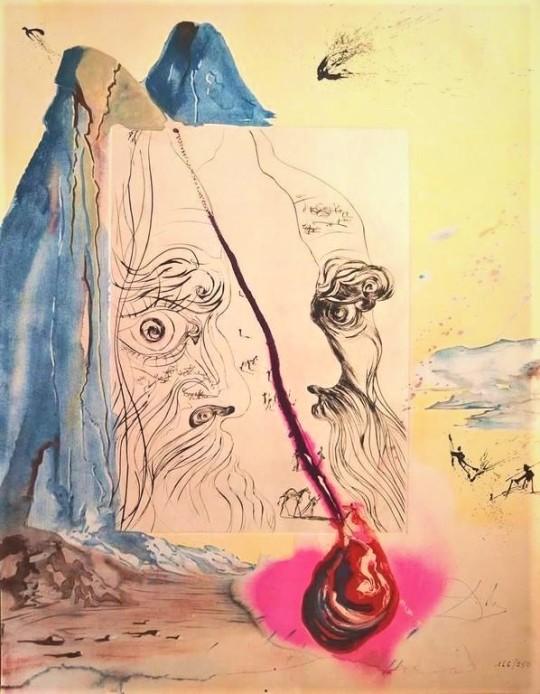
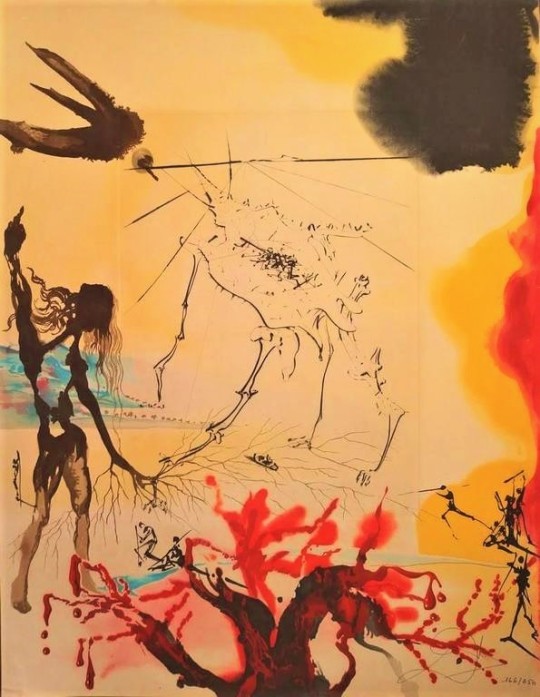
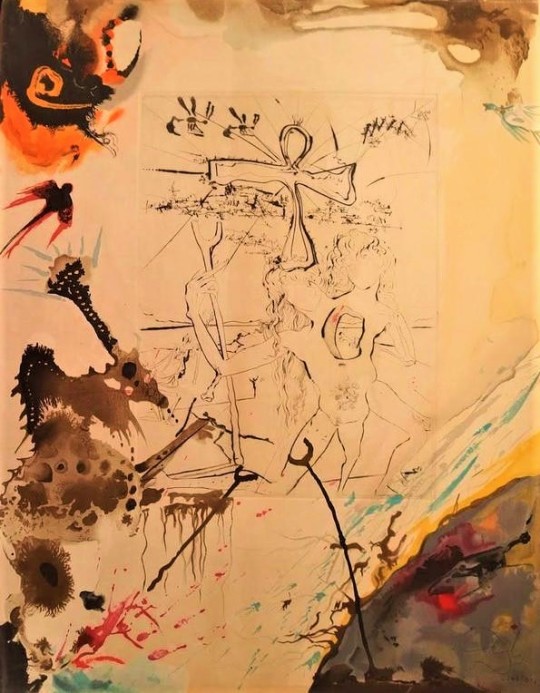
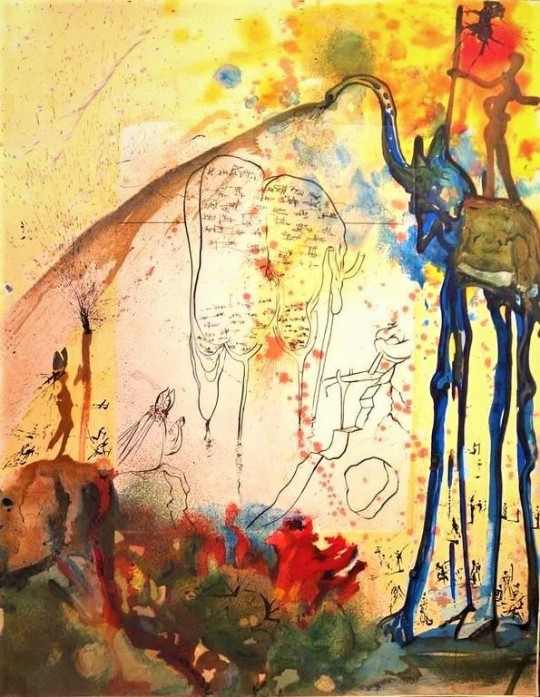
Freud’s book, from 1939, consists of three essays and is an extension of Freud’s work on psychoanalytic theory as a means of generating hypotheses about historical events. Freud hypothesizes that Moses was not Hebrew, but actually born into Ancient Egyptian nobility and was probably a follower of Akhenaten, an ancient Egyptian monotheist. The biblical story of Moses is contradicted by Freud, who retells the events, claiming that Moses led only his close followers into freedom after Akhenaten’s death.


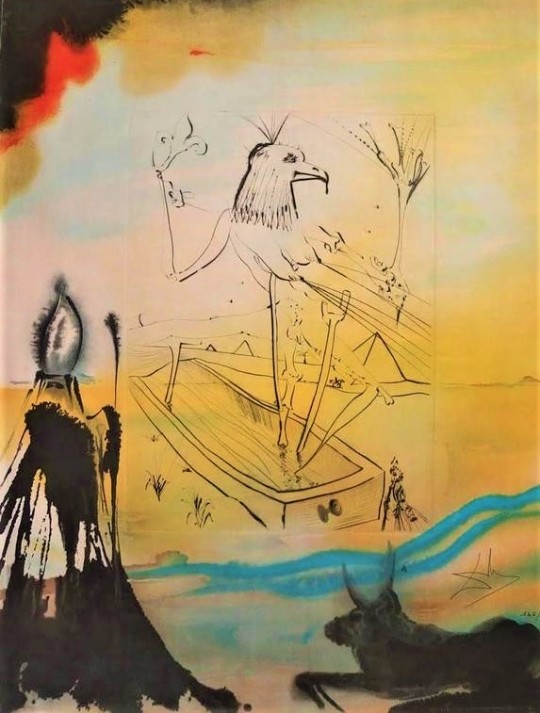
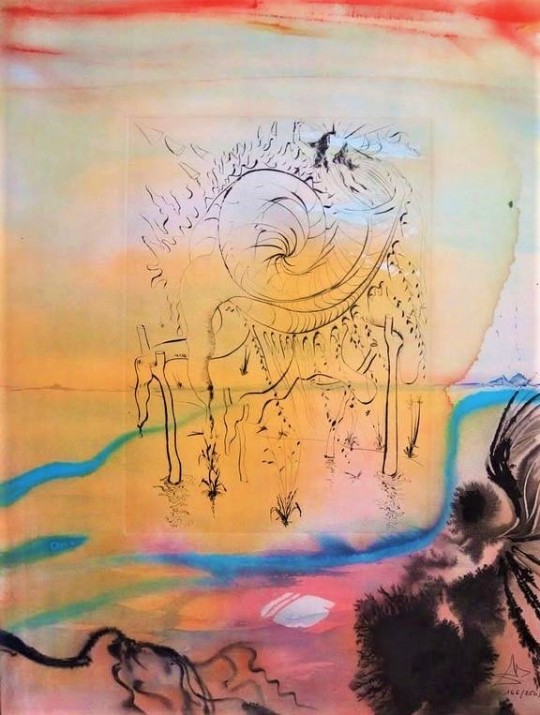
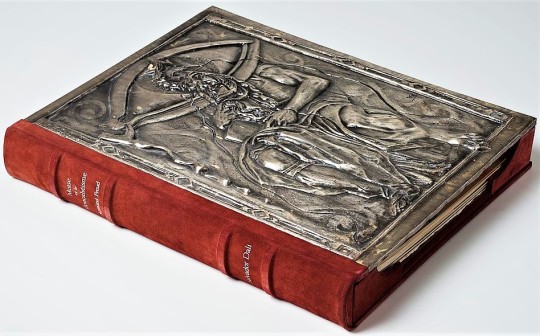
The 1975 “Dali Edition” features a tall in-folio in opening red velvet case, with a bas-relief sculpture as cover (depicting Moses), two plexiglass folders: one for the etchings, the other for text. The portfolio includes 10 original hand-signed etchings and lithographs printed on lambskin. There are also 14 woodcuts (including title page and a full page portrait of Moses frontispice)
72 notes
·
View notes
Text
Christians who point out various "advanced" societies developing monotheistic belief systems as a way to bolster Christianity's supposed superiority are engaging in cultural erasure. Just because another culture has a monotheistic belief system, doesn't mean it's anything like Christianity - much less that its existence suggests that Christianity is more valid than other forms of religion.
75 notes
·
View notes
Text
I’m bored here’s a poll
This is all lighthearted, not here to start any debates. I just find it interesting :)
#poll#tumblr polls#random polls#religion#spirituality#monotheism#polytheism#paganism#agnosticism#atheism#animism#nonhuman#alterhuman#therian#otherkin
18 notes
·
View notes
Text
Watching fantasy high and i had a thought.
I noticed there was an idea about diety and religion kind of baked into the theology of Brendan's world building that made me wonder about religion in real life. And that is the idea that the goal of religious practice is to find The Religion and The Diety that you commit to forever and vice versa. It's baked into the mechanics of how the existence of dieties work. Gods need worshippers to exist, which would motivate them to be possessive and demand loyalty. The no-telling-about-dead-gods law is a good example of this. Gods don't share, and you can't change religions.
The idea kind of stands out because it feels familar. I realized it mirrors how we think of God in western culture. The idea of a jealous, possessive God is very prevalent in our culture maybe even fundamental. When I thought about ancient religions with big pantheons I kind of imagined people would pick one diety to be their diety and specifically only worship them forever even if they believed other gods existed, the way Christians treat the christian God. But I realized that was because my understanding of religious practice comes from a Christian background. God is a jealous God is a Christian/Jewish/Islamic idea.
Realizing that kind of brought it into question. I wondered what an alternative would be like. Maybe a better system for human beings would be to allowed more flexibility. It's natural to move through life and change and evolve. A lot of people might need different things and different times in their life. Maybe you need Jesus at one point but then later in life you need the Tao. Maybe you need the Moon Goddess at one point, but experience something you need permission to rage about.
Using the context of Fantasy High as an analogy, maybe it would make more sense if deities were allowed to actively share. Why couldn't they pass along worshippers who needed more doubt in their life to Cassandra? Why couldn't a God aks if their worshipper needed something different and try to help them find that? (Of course, mechanics come into question here but Im guessing those mechanics happened because of Sir Terry Pratchett. But that's another conversation.)
In the real world I think this is just as relevant. What if expecting one religion to work for a person forever is not a healthy expectation? Maybe there are people who would fit in as Christians forever. But maybe there are a lot of people who don't. What could be possible if we had a concept of flexibility in religious practice and belief? Why do we expect gods to be possessive?
Also makes me wonder. Whose idea was it to create that law in Fantasy High that forces the Gods to compete all the more fiercely? 🤔
#fantasy#fantasy high#brennan lee mulligan#bad kids#gods#goddesses#pagan#paganism#christianity#theology#dnd#d&d#religion#exmo#dimension 20#literature#monotheism#pantheism
23 notes
·
View notes
Text
catholics I have a question
not to sound like a protestant but do all of you actually use rosaries? there is no shame in any act of prayer, and that's not where this is going! i'd been told that "cAtHoLiCs ArE eViL tHeY uSe IdOlS" and while i think other protestants hating on yall (we are so sorry about the southern baptists) is cringe, why would you pair the physical religious artifact of a crucifix -more often than not with a white Jesus on it- with something as spiritually connecting as prayer? when you look at it formulaically it kinda seems like an idol, but I find it ridiculously hard to believe that someone devout enough to use a rosary would use it in an idolatrous way or in a way disrespectful to the text. and the "catholics are idolators" seems like protestant propaganda anyway
how are you guys praying? if you believe in something we can't scientifically hypothesize about, especially if youre catholic but open to all religions, denominations, sub groups, beliefs, -gnostics how do you reach out to your concept and understanding of God?
tag as many religions as you want, be kind, remember you represent your religion, do to others as you would like them to treat you or get blocked. no cults please- this is strictly spiritual
#religion#catholic#protestant#belief#pray#prayer#monotheism#polytheist#islamic#hinduism#buddhism#paganism#pagan#i have so many questions about catholicism#and everyone elses religions
40 notes
·
View notes
Text
Beyond the ruined kingdoms of the elves. Past the mountains where goblins live. Under the bridge that connects the heavens and the earth, lies the tomb of the conquering god. The god who called himself the only god that ever was and ever will be, and looked into the eyes of other gods with wrath.
When the conquerer god first set out to take the world that he knew he traveled from his home in the north to the world he did not yet know. He road upon a horse made of memories, and wielded an axe forged from eyes. His followers came too, and those who were not his followers died, and those who did not die where his followers.
And first he came to the kingdom of the astronomer of the gods, who looked at the stars, and told the future, from his great tower ruling with owl eyes and a crown of steel. And the conqueror god said to him, "You are but a myth, and a madness. When you predict the future you defy me for only I know that future, and when you look at the stars you defy me for only I know the stars." And the astronomer tried to bow to him, and offer a peace, but the conqueror's axe was sharp and heavy, and he took his head. And those followers who did not become his died, and those who did not die became his.
Then he came to the god of love, who ruled from his mansion of silver, and lived in a garden of steam and sweat. And the conquorer said to the god of love, "You are a demon and traitor. You seek to bring my people to degenerate and distract them with the pleasure of the world." And the god of love sung to him, and hoped to soften his hard heart, but the conqueror's axe was sharp and heavy, and he took his head. And those followers who did not become his died, and those who did not die became his.
And then he came to the kingdom of the goddess of war. And when she saw him she knew what to do, she ordered her people flee, and spoke no words to him. And for ten years and ten hours the god and goddess fought, and their eyes grew bloodshot, and her spear bloodied his side, and his axe bloodied her's. But in the end his axe stuck her arm, and made it lay upon the bloodied ground. And she flew away like a great hawk, and when she was gone he claimed he had killed her. And those followers of her's he could find perished, as he had the converts he needed.
And the conquorer stood on the throne of a hundred fallen gods' swords. And he made his home on the cliffs. And he ruled. And when he ruled he first said to his priests that he decided they were sorcerers, and that humans should not have such power, and thus his axe's mercy took them. And then to his angels, he called them devils, and that they stood to block out his holy light, and his axe's mercy took them likewise.
And then he stood alone. And he saw his body. And he saw the only worthy sacrifice to him. If mortals worshiped his body they did not worship him, his body and voice were an idol. And he believed his own lie, and thought himself to be the god of the universe, and that all thing were below him that were of nature. And he turned his axe upon himself.
And there he died, and there he will die forever. As the atheist god, who kills all gods he saw.
#196#my thougts#worldbuilding#writing#fantasy#my writing#my worldbuilding#anti christianity#myths#myth#mythology#folktale#folklore#gods#pantheon#monotheism#short fiction#short story#flash fiction#dark fantasy#weird fiction#angels#angel#demons
23 notes
·
View notes
Text
i’m in this strange phase where i’m trying to explore my spirituality and to understand what divinity means to me and it’s just. hard. complex.
i was raised in an atheist family but now i know, deep down, that i am not an atheist. but atheism is still inscribed in my brain, the shame of worshipping, the shame of honoring the divine, as if it should be hidden, as if i was being irrational.
i have been practicing, or trying to practice, hellenic polytheism for a little while now. i keep going through phases of faith then of doubt. something isn’t quite right yet.
i love religions— all of them interest me. i just decided i wanted to read the Old Testament, so i’m reading the Genesis now. and i’ve been doing research on Judaism, out of curiosity. it fascinates me— but especially the rules. the constant connection to the divine, even in mundanity. the concept of every action having a purpose, of doing things a specific way and knowing why, of finding God everywhere and honoring God all the time. i see a lot of people being scared of religious obligations, of organized religion, and i understand how it can be dangerous at times, but i yearn for the order, for the meaning.
i want organized worship and i want to find God every day. i want to do everything with the intention of connecting to the divine. and yet i don’t know what the divine is, what God(s) is (are), and i still believe monotheism isn’t for me, something about it bothers me— but maybe it’s just christianity ? i don’t know anything anymore. i know polytheism interests me too and i know my autistic special interest is ancient greek religion and ancient cultures, but it’s hard to draw the line between what interests me due to my autism/simply because i find it amazing to learn about, and what interests me because it feels right and aligns with the way i perceive things.
so i keep doubting, i doubt and wonder and question and find myself irrational whenever i think of a God, or of multiple gods/Theoi. i know i believe in something. but there is this atheistic guilt, atheistic shame ?
i’m so lost.
and everyone i know is either an atheist or a usually-not-very-observant catholic. so exactly what i already know not to be for me.
#judaism#hellenic polytheism#religion#theology#religious beliefs#divinity#helpol#polytheism#monotheism#paganism#trying to figure out what religion makes sense for me#and it’s scary#quite often i wish i had been raised within an organized religion so that i could have felt the order and the rules and the meaning#and then could have decided for myself whether or not it felt right#i would never have felt good in christianity#and i know i’m lucky because being in an atheist family protected me from religious trauma#but still#i feel lonely#and purposeless#i’m still trying to find god(s)
40 notes
·
View notes
Text
Something that I don’t see often brought up in discussion of Tolkien is that the entire Legendarium is supposed to be a collection of “in-universe” documents written by actual characters within the fictional universe. The Hobbit and Lord of the Rings are basically Bilbo’s and Frodo’s memoirs, and the Silmarillion is supposedly Bilbo’s translation of old Elven epics.
In short, Tolkien has no omniscient narrator. The in-universe could only write of things thet’d either seen first hand or received from older sources.
This is particularly interesting when you look at the relationship between Eru and the Valar in the Silmarillion. It really does read like an older polytheistic myth cycle being rewritten to fit a new monotheistic framework ala Snorri Sturluson or the Lebor Gabála Érenn.
Now the real world reason is 'cuz Tolkien was a both a devout Catholic and a Norse Mythology fanboy and wanted to incorporate the two in his personal mythology. But taking the conceit that the Silmarillion is an actual semi-historical document left by a now extinct culture suggests it was composed while said culture was transitioning from polythesim to monotheism, from Valarism to Eruism.
I'd tentatively suggest that the Valar were the original polytheistic pantheon of the Eldar, while Eru was the monotheistic god of the Edain, the ancestors of the Numenoreans/Gondorians. As the two cultures began to mingle, so to did their respective belief systems.
One may speculate that in the original "pure" Eldarin version of the cosmology, Iluvatar (distinct from the Mannish god Eru) was more akin to the Greek Ouranos or Norse Buri, a mere starting point for the divine genealogy rather that an active participation in the mythology or object of any special worship or reverence. At least until he was conflated with Eru.
The real smoking gun I think is Manwë, the chief Vala and ostensible High King of all Arda. At first glance, Manwë is the very model of a supreme sky god ala Odin or Zeus. But of course, we already have a Supreme Deity in the form of Eru.
In the Quenta Silmarillion as received, Manwë seems to serve largely as Eru’s mouthpiece. This suggests that the Eruists deemed Manwë unsuitable for synchronisation with the transcendent Eru (perhaps because of his familial associations with both Melkor and Varda) yet could not entirely excise him from the original myth cycle, so settled for figuratively demoting him to the role of godly spokesperson.
I’m sure a more learned Tolkien scholar could blow all this out of the water but it’s an intriguing line of thought.
#tolkien#silmarillion#eru#eru iluvatar#manwë súlimo#valar#polytheism#monotheism#eldarin#quenta silmarillion
54 notes
·
View notes
Text
I'm curious. By the "late pagan" periods of Rome, Greece, and Egypt you start seeing a lot monistic and even quasi-monotheistic solar theology in a lot of places, so did Christian theology adapt that by identifying God with the sun or did they make the sun subordinate to God?
I will say though that, in the Greek Magical Papyri, there are spells or prayers on the one hand in which Helios could be identified with Iao, or on the other hand spells or prayers where Sabaoth or one of the other forms of the God of Judaism is placed above Helios or the sun.
20 notes
·
View notes
Text
Reasons to be atheist/not-pagan in the Riordanverse:
1) please do you actually see those superpowered immortal assholes as gods in anything but name??
2) confuse people. “Wait why are you saying Jesus Christ?? You’re a child of [random god]?” “Patricia I am an atheist I say whatever the fuck I want.”
3) annoy the gods. “Stop saying oh my god. There’s multiple of us.” “Fight me, Janice.”
4) literally why not you have the right to believe whatever you want and don’t owe an explanation to anyone about your beliefs.
#religion#riordanverse#paganism#monotheism#percy jackson tv series#pjo show#the gods#olympians#norse gods#egyptian gods
15 notes
·
View notes
Note
Thank you for your answer to my question about prayer, but what could I possibly offer a god that they don't already have?
Oh good question, so I think each polytheistic culture (and maybe even each person?) has their own philosophy on this idea, but we have fundamentally different views on what our deities are... like at their core... than say a Christian.
In Christianity God is omnipresent omniscient omnipotent. That is not how our deities are viewed. If you are familiar with the Catholic flavor of Christianity thinking about saints might be helpful. Many people pray to and leave offerings for saints, some families have personal or familial saints they think have invested interests in them and look out for them especially. (you'll even see that many local deities across the world were 'demoted' to sainthood once Christianity became established in their areas). The big difference here is that saints are able to do what they do BECAUSE the Christian god allows them or endows them (allegedly) but polytheistic deities don't need to borrow someone else's power, it is theirs to use.
This is also not to say in any way that the polytheistic deities are less than the Christian one. I believe the ideas of him being so much MORE was well done propaganda. Early Christian philosophy and writings didn't have him so, he was just a deity to choose from like all the rest, he just stood alone in his pantheon and wanted his people to ONLY follow him. As Christianity spread to more polytheistic areas and the locals asked "yea, but why should I follow your guy when mine do just fine?" they would have needed a convincing answer. To say he is omnipresent omniscient omnipotent, would be a good one.
So back to the original question, I don't know WHY the deities need or want things from us (again I think each culture and maybe each person has their own ideas on this) but it is clear that they DO. So going back to the parallel to saints; food and other small offerings especially those related to the deity left somewhere meant for them is always a soild option. Some people do devotional acts (martial arts is a big one for those following battle related deities or in my case I often offer research I have done). Anything your deity might enjoy, you can offer.
Maybe its like when you hear stories about crows bringing people who regularly feed them gifts? a little shiny item or stick really has no inherent value to us but as a sign of friendship and love from a crow it becomes so valuable we might keep it for the rest of our lives.
#ask#anon#monotheism#monotheistic#polytheistic#polytheism#offerings#deities#deity work#deity worship#deity#saints
18 notes
·
View notes
Text
Reminder that the whole narrative that once upon a time everybody used to be polytheistic and matriarchal until those mean monotheists came along with their patriarchal god is unsupported by actual historical evidence.
143 notes
·
View notes
Text
Varieties of Theism
Agnostic Theism
Whereas atheism and theism deal with belief, agnosticism deals with knowledge. The Greek roots of the term combine a (without) and gnosis (knowledge). Hence, agnosticism literally means “without knowledge.” In the context where it is normally used, the term means: without knowledge of the existence of gods. Since it is possible for a person to believe in one or more gods without claiming to know for sure that any gods exist, it's possible to be an agnostic theist.
Monotheism
The term monotheism comes from the Greek monos, (one) and theos (god). Thus, monotheism is the belief in the existence of a single god. Monotheism is typically contrasted with polytheism (see below), which is a belief in many gods, and with atheism, which is an absence of any belief in any gods.
Polytheism
Polytheism is the belief in the existence of multiple gods. The prefix ''poly'' means many, so polytheists believe that there are multiple divine forces in existence. The Greek and Roman pantheons are excellent examples of these, as they consist of many gods that govern different aspects of nature and essences of humanity. Some argue that Christianity is a polytheistic religion because of the worship of the Trinity. However, the Father, Son, and Holy Spirit are all aspects of a single God, making it a monotheistic religion.
Deism
Deism is actually a form of monotheism, but it remains distinct enough in character and development to justify discussing separately. In addition to adopting the beliefs of general monotheism, deists also adopt the belief that the single existing god is personal in nature and transcendent from the created universe. However, they reject the belief, common among monotheists in the West, that this god is immanent—presently active in the created universe.
Henotheism and Monolatry
Henotheism is based upon the Greek roots heis or henos, (one), and theos (god). But the term is not a synonym for monotheism, despite the fact that it has the same etymological meaning.
Another word expressing the same idea is monolatry, which is based on the Greek roots monos (one), and latreia (service or religious worship). The term appears to have been first used by Julius Wellhausen to described a type of polytheism in which just a single god is worshiped but where other gods are accepted as existing elsewhere. Many tribal religions fall into this category.
Pantheism
The word pantheism is built from the Greek roots pan (all) and theos (god); thus, pantheism is either a belief that the universe is God and worthy of worship, or that God is the sum total of all there is and that the combined substances, forces, and natural laws that we see around us are therefore manifestations of God. The early Egyptian and Hindu religions are regarded as pantheistic, and Taoism is also sometimes considered a pantheistic belief system.
Panentheism
The word panentheism is Greek for “all-in-God,” pan-en-theos. A panentheistic belief system posits the existence of a god that interpenetrates every part of nature but which is nevertheless fully distinct from nature. This god is, therefore, part of nature, but at the same time still retains an independent identity.
Impersonal Idealism
In the philosophy of Impersonal Idealism, universal ideals are identified as god. There are elements of impersonal idealism, for example, in the Christian belief that "God is love," or the humanist view that "God is knowledge."
Autotheism
The term ''autotheism'' is composed of two parts: the prefix, ''auto,'' and the root/suffix combination, ''theism.'' ''Auto'' means ''self, one's own, by oneself.'' So, autotheism is the belief that one is a god themself. It has also been described as someone who mistakes one's inner voices as God's voice within them.
Kathenotheism
The belief that there are many gods, but only one deity at a time should be worshipped, each being supreme in turn.
Ditheism (or Duotheism)
The belief in two equally powerful gods, often, but not always, with complementary properties and in constant opposition, such as God and Goddess in Wicca, or Good and Evil in Zoroastrianism and Manichaeism. The early mystical religion Gnosticism is another example of a ditheistic belief of sorts, due to their claim that the thing worshipped as God in this world is actually an evil impostor, but that a true benevolent deity worthy of being called "God" exists beyond this world.
Misotheism
The belief that gods exist, but that they are actually evil. The English word was coined by Thomas de Quincey in 1846. Strictly speaking, the term connotes an attitude of hatred towards the god or gods, rather than making a statement about their nature.
Dystheism
The belief that gods exist, but that they are not wholly good, or possibly even evil (as opposed to eutheism, the belief that God exists and is wholly good). Trickster gods found in polytheistic belief systems often have a dystheistic nature, and there are various examples of arguable dystheism in the Bible.
Animism
Animism is the idea that all things—animate and inanimate—possess a spirit or an essence. First coined in 1871, animism is a key feature in many ancient religions, especially of indigenous tribal cultures. Animism is a foundational element in the development of ancient human spirituality, and it can be identified in different forms throughout major modern world religions.
Totemism
Totemism is a system of belief in which man is believed to have kinship with a totem or a mystical relationship is said to exist between a group or an individual and a totem. A totem is an object, such as an animal or plant that serves as the emblem or symbol of a kinship group or a person. The term totemism has been used to characterize a cluster of traits in the religion and in the social organization of many primitive peoples.
#theism#paganism#greek polytheism#varieties of theism#animism#totemism#dystheism#misotheism#ditheism#duotheism#kathenotheism#autotheism#panentheism#pantheism#henotheism#deism#monotheism
192 notes
·
View notes
Text
“ What land should I flee to?
Where should I go to flee?
From my family and from my clan
They banish me.
The community to which
I belong has not satisfied me
Nor have [the rulers] of the country.
How, Thee, can I satisfy, O Mazda Ahura? ” (Yasna 46.1)
Zarathustra, prophet of Zoroastrianism, after his vision that monotheism must be the only true god, debated all those among the priestly class and won in each case, but the king still wanted to throw him in prison. Around this time, he wrote these lines. Only some time later, after a private audience with the King, did the King come to understand his ideas, seeing that the priestly classes main concern was a threat to their power, and he changed his mind, granting him his life.
#zoro#zoroaster#zarathustra#persian#iran#persia#history#religion#religious history#archeology#ancient history#ancient religion#zoroastrianism#religious studies#monotheism#spirituality#quotes#literature#interesting#facts
20 notes
·
View notes